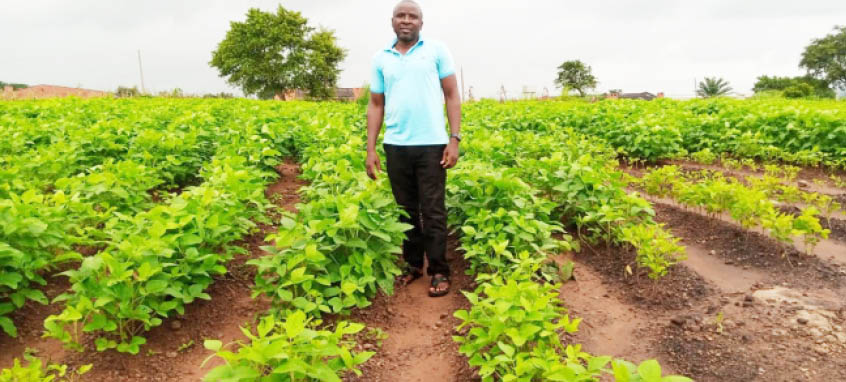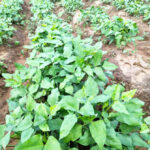By Hope Abah Emmanuel, Denen Achussah & Dorathy Aninge, Makurdi
Farmers in Benue State could certainly have attained quantum production of crops in their quest to become Nigeria’s pride in agriculture but for the government’s insufficient attention to the sector.
Over the years, the farmers have continued to rely on old ways; using hoes, cutlasses, sickle, among others, to cultivate crops.
Therefore, it was in the bid to change the experiences of the farmers for the better that Governor Samuel Ortom seven years ago assured that he would actualise his main campaign promise of using the wheel of agriculture to industrialise the “Food Basket of the Nation” state.
To match his words with action, in Ortom’s first budget presented in December 2015, for the 2016 fiscal year, the agricultural sector took N6.2bn of the N58bn lion’s share for the economic sector out of the total approved budget of N150.7bn. It was indeed a far departure from the N700m budgeted for the Ministry of Agriculture in 2015 by the preceding government.
A day with fish merchants of Lagos
ABU to begin production of farm implements with local content
Ortom, while presenting his first budget, emphasised that, “We have prioritised agriculture with emphasis on farm mechanisation, land development, rehabilitation of agro-service centres and Colleges of Agriculture.”
This, he said, was in line with his administration’s key pillar of agriculture-driven industrialisation with a view to generating wealth, as well as provide employment for youths.
Sadly, however, most farmers have said nothing much has changed in the sector as farmers continue to experience poor harvest and post-harvest losses due to lack of processing industries, antics of middlemen and multiple taxation.
Some of the farmers opined that they had made snail progress in certain areas and would have done better if the state government had stuck to funding the agricultural sector appropriately.
A rice and soybean farmer in the state, Vitalis Tarnongu, said “The challenge has always been finance. I have been in the farming business for 25 years and finance has been the issue. I sometimes get support from USAID, but mostly it’s my personal effort. It has not been easy as an individual to push forward, but if the government can come in and help a little bit, we would not be talking about 250 hectares; which I’m doing now.”
The Chairman of Soybean Farmers Association (SFA) in the state, Comrade China Peters, said “We have not produced expected products that are needed in Benue. When this government came in, we started the Anchor Borrower Programme (ABP) in 2017. We thought they were taking us out of poverty. The programme did not go anywhere as they distributed inputs to farmers, but when it came to cash, we didn’t see anything.
“And for fertiliser, over the years, we get from vendors. The government has not given us fertilizer. Last year, we bought a bag for N7,500, while this year we bought for N33,000.”
Meanwhile, it would be recalled that one of the cardinal points of the Ortom administration as encapsulated in his blue print: “Our Collective Vision For A New Benue”, is agriculture driven-industrialisation. He planned that his government would stimulate agricultural growth through modernisation, diversification, genetic upgrade, disease control and commercialisation.
Ortom’s plan on agriculture also include establishing organised markets for produce, establishment of Agriculture Credit Financing Scheme (ACFS), creating an agency to promote and facilitate investment inflow and export, establishing a bank to make international financial transactions and provide credit guarantee services to facilitate access to capital by Small and Medium Enterprises (SMEs).
Going by Ortom’s plan, N10.5bn was sufficient to achieve his purpose in agriculture in the first four years of his tenure occasioned by his government’s yearly budget of over N100bn.
To this end, the approved budgetary figure for agriculture in the state had been consistent in the past seven years, except for 2020 as a result of COVID-19, being on the high side. But little, not commensurate with the needs of the farming population, is actually released for fertiliser, seeds and seedlings, while salaries usually took a chunk of the budget for the sector.
Fertiliser subsidy, which until the administration of Ortom was a yearly ritual, has now become difficult for his administration to achieve, as instead of getting it from the ministry, the farmers are made to acquire it from government-designated vendors, a development not too pleasant with the farmers. The government has developed a different model, which means that the government no longer procures fertiliser but contracts it out. The contractor then procures the consignment and the agriculture ministry monitors the delivery to the farmers who then buy at a “subsidised” rate.
The Ortom-led government, on assumption, released N87m as counterpart fund in the area of value chains and rice production which was captured in the 2017 total approved state budget of N183.3bn, indicated an approval of N5.6bn for the ministry from where the development corporations resulted in capacity building for over 15,500 cassava and rice farmers in Good Agricultural Practices (GAP) to include a 3.2 metric tonnes of improved and certified seeds of soybean; 6.2 metric tonnes of rice; supply of rice destoner for rice processors with 8,700 farmers who so far benefitted from the ABP.
In addition, the N228.5 approved state budget document in 2018 of which N6.2bn actual release to the agriculture ministry showed that government was able to subsidise the procurement of 180 trucks of assorted brands of granulated fertiliser, 5,000 litres of liquid fertiliser, 2,500 litres of organic liquid fertiliser and 2,500 litres of plant health promoter.
This effort as shown in the document led to increased yield of rice and soybean from 2.5 metric tonnes and 1.2 metric tonnes to 3.5 metric tonnes and 2.5 metric tonnes per hectare respectively. A contract was awarded to WAW Motors Nigeria Limited for the supply of 50 tractors.
By 2019, an approved budget of N199.7bn of which actual released total expenditure stood at N62.2bn without an exact breakdown for the crop production, N2bn, was approved for fertiliser procurement and land development.
However, the state government depended on the 240 truckloads of fertiliser released by the federal government to support farming in 2020 because the approved budget of N108bn could not be achieved due to the global revenue fall occasioned by COVID-19 such that the government could only spend N34.4bn of its entire budget by the second quarter of the year.
In 2021, the state government, out of the total approved state budget of N134.3bn, spent N559m between January and June on the agricultural sector from the sector’s approved budget of N3.6bn for that fiscal year. The breakdown of the spending for the sector as contained in the document shows that within the period, nothing was actually released for the production of rice and other crops under project description – construction/provision of agricultural facilities for which the sum of N4.2m was approved.
However, in the same year, N263m was expended between January and June on purchases of agricultural chemicals —fertiliser procurement and distribution—whereas N100m was originally approved. This means that the government exceeded its spending on the particular purchases as shown in the approval.
As at the time of this report, there was no documented spending of the government for the 2022 budget of N155.6bn out of which N56.7bn was appropriated for the economic sector under which N8bn was approved as total estimate for the agriculture sector.
Meanwhile, the 2022 approved supplementary capital expenditure shows an approval of N10m for the construction/provision of agricultural facilities for rice and other crops production, while N500m was approved for purchase of agricultural chemicals and fertiliser procurement and distribution.
Farmers’ reaction
The state’s chairman of the All Farmers Association of Nigeria (AFAN), Comrade Aondongu Saaku, however, believes that agriculture improved in the past seven years under the present government in some areas while other aspects of the sector remain neglected.
He said, “Farmers had in the past years not benefited from any programme. But in 2016 and 2017, the ABP started and those that were not farmers ventured into farming. That is why now you can’t differentiate between civil servants and farmers because most civil servants are now farmers. So, there has been improvement in production, and also in the number of the people carrying out the programme. There has been improvement in the production of rice, soybean and orange.”
Chief Atsaga Anemba, the state’s Chairman of the Fruit Farmers Association (FFA), said that there were several opportunities for orange farming, but that several factors had become a concern to orange production in the state.
He said, “I’m talking in terms of acquiring agro inputs that are involved in the maintenance of our fruit farms, which is usually a challenge. And even getting good avenues to market farm produce is also a problem largely due to the fact that there are no industries. We expect the government to provide industries for us so that it will ease the suffering of our peasant fruit farmers.”
Government’s reaction
Meanwhile, the Director of Agricultural Science in the Ministry of Agriculture and Natural Resources, Dr Thomas Unongo, explained that the present administration had done a lot in the area of agriculture, emphasising that the ministry kept doing its best to build the resilience of farmers so that they could build on the challenges faced in the past seven years occasioned by security challenges and climate change.
He said, “The government has been able to provide tractors and supply to farmers and cooperatives who in turn are leasing out the tractors to farmers at highly subsidised rates. This and many others have assisted us in retaining the name ‘Food Basket of the Nation’. We help the schools of agriculture like the College of Agriculture Yandev, and we have been able to introduce close to 15 new varieties of orange and people have been trained on how to get good inputs.
“As for soybean, the National Cereal Research Institute (NCRI), Badagary, in conjunction with the University of Agriculture Makurdi, has been able to get different varieties of the seedlings for farmers which have early maturity and are tolerant to weed and the yield is very high. The output used to be 0.6 and now farmers get up to three tonnes per hectare.
He, however, noted that, “The budget for the past three years has not been implemented in full, but the state government has spent over N3m in procurement of seeds for distribution free, especially among the IDPs. The ministry handles the logistics of procuring the seeds from companies for onward distribution to farmers.
“The sum of N2bn was also paid to the Bank of Industry so that farmers can go there and obtain loans to upgrade their farms.”
This report is funded by the Daily Trust Foundation with support from the MacArthur Foundation

 Join Daily Trust WhatsApp Community For Quick Access To News and Happenings Around You.
Join Daily Trust WhatsApp Community For Quick Access To News and Happenings Around You.



